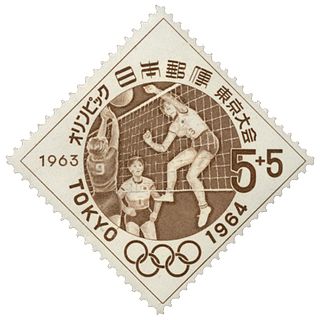
The judo competition at the 1964 Summer Olympics was the first time the sport was included in the Summer Olympic Games. As a result, decades of judo being officially banned as an "imperialist sport" in the Soviet Union ended shortly before the Games started, as Soviet authorities prioritized winning medals over anything else. The medals were awarded in 4 classes, and competition was restricted to men only. The competition was held in the Nippon Budokan, which was built to host the competition.

Basketball contests at the 1964 Summer Olympics was the sixth appearance of the sport of basketball as an official Olympic medal event. It took place at the Yoyogi National Gymnasium in Tokyo, Japan from October 11 to October 23. The United States defeated the Soviet Union to win their sixth consecutive gold medal at this event, while Brazil earned the bronze against Puerto Rico.
At the 1964 Summer Olympics in Tokyo, the athletics competition included 36 events, 24 for men and 12 for women. The women's 400 metres and women's pentathlon events were newly introduced at these Games. There were a total number of 1016 participating athletes from 82 countries.

At the 1964 Summer Olympics, fourteen different artistic gymnastics events were contested, eight for men and six for women. All events were held at the Tokyo Metropolitan Gymnasium in Tokyo from 18 October through 23 October.

The NHK Spring Mitsuzawa Football Stadium is an association football stadium in Kanagawa-ku, Yokohama, Japan. It serves as a home ground of Yokohama FC and, on occasion, Yokohama F. Marinos. Until 1999 it had been the home of Yokohama FC's spiritual predecessor, Yokohama Flügels, and also, on occasion, of Kawasaki-based NKK FC. The stadium holds 15,454 people.

Komazawa Olympic Park Stadium (駒沢オリンピック公園総合運動場陸上競技場) is a multi-purpose stadium in Setagaya, Tokyo, Japan. The stadium is an integral feature of Komazawa Olympic Park and is currently used mostly for football matches and rugby union games. The stadium has a capacity of 20,010.

At the 1964 Summer Olympics in Tokyo, eighteen swimming events were contested, ten for men and eight for women. There were a total of 405 participants from 42 countries competing. For the first time, the 4 × 100 metres freestyle relay for men and the 400 metres individual medley for both men and women were contested. Olympic records were broken in all events and the world record was broken in ten events. This competition also marked the debut of electronic touchpads for timing.

At the 1964 Summer Olympics, 16 wrestling events were contested, for all men. There were eight weight classes in Greco-Roman wrestling and eight classes in freestyle wrestling.

Rowing at the 1964 Summer Olympics featured seven events, for men only.

The 1964 Summer Olympics was the first time that volleyball had been held as an Olympic sport. The sport would feature two medals during this games with the men's and women's indoor teams events. In both tournaments, the format was the same with a single round robin between all of the teams that was competing in the tournament.

Canoeing at the 1964 Summer Olympics was held between 20 October 1964 and 22 October 1964 on Lake Sagami, 60 kilometres from Sagamiko, Kanagawa, Japan. There were 7 events, 5 of which were for men and 2 for women. Both of the women's events were 500 metre kayaking events; there were three kayaking and two canoeing events for men, all of which covered 1000 metres. The K-4 event for men was introduced to the Olympic program at these Games, replacing the 4×500 metre K-1 event that was raced in the 1960 Games.

At the 1964 Summer Olympics in Tokyo, four diving events were contested during a competition that took place at the Yoyogi National Gymnasium, from 11 to 18 October, comprising 80 divers from 20 nations.

Water polo at the 1964 Summer Olympics was held at the Yoyogi National Gymnasium in Shibuya, Tokyo. The gymnasium was built in 1961-1964 as the first indoor pool for Olympic water polo; it also hosted all swimming and diving events and could accommodate over 13,000 people.

The weightlifting competition at the 1964 Summer Olympics in Tokyo consisted of seven weight classes, all for men only. It also counted as 1964 World Weightlifting Championships.

Yokohama Cultural Gymnasium was an indoor sports arena located in Naka-ku, Yokohama, Kanagawa, Japan. The capacity of the arena is 5,000 people and was opened in 1962.

Camp Asaka is a base of the Japan Ground Self-Defense Force. It lies in four municipalities: Nerima, Tokyo; Asaka, Saitama; Wako, Saitama; and Niiza, Saitama. It serves as the headquarters of the Eastern Army.
Hachioji Velodrome was a temporary velodrome located in the Hachiōji, Tokyo area. Constructed between March and August 1964, it hosted the track cycling events for the 1964 Summer Olympics. The site of the velodrome was later converted to a public park called Ryonan Park.
The Komazawa Hockey Field was a venue constructed in Tokyo, Japan for the field hockey competitions of 1964 Summer Olympics. Although there were three hockey fields, it marked the first time the field hockey was played in one single venue for the Summer Olympics since the 1920 Games.

The Komazawa Volleyball Courts are a volleyball venue located in Tokyo, Japan. It hosted some of the volleyball preliminaries for the 1964 Summer Olympics.
The Tokorozawa Shooting Range is a firing range located in Tokorozawa, Saitama, Japan. It hosted the trap shooting part of the shooting events for the 1964 Summer Olympics in neighboring Tokyo.


















